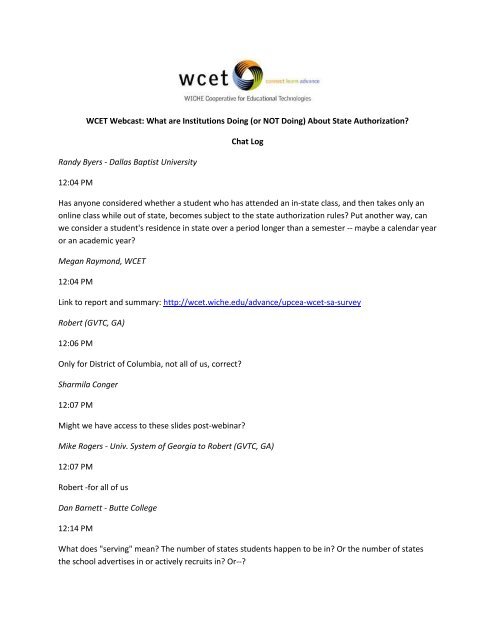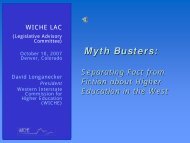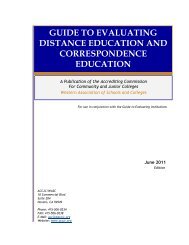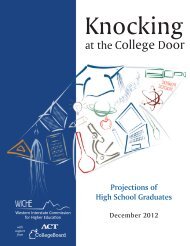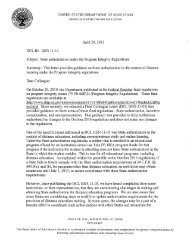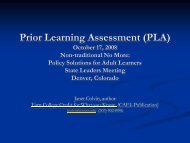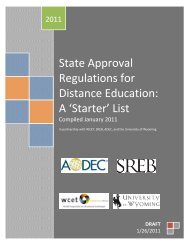Chat Log - WCET - WICHE
Chat Log - WCET - WICHE
Chat Log - WCET - WICHE
Create successful ePaper yourself
Turn your PDF publications into a flip-book with our unique Google optimized e-Paper software.
<strong>WCET</strong> Webcast: What are Institutions Doing (or NOT Doing) About State Authorization<br />
Randy Byers - Dallas Baptist University<br />
12:04 PM<br />
<strong>Chat</strong> <strong>Log</strong><br />
Has anyone considered whether a student who has attended an in-state class, and then takes only an<br />
online class while out of state, becomes subject to the state authorization rules Put another way, can<br />
we consider a student's residence in state over a period longer than a semester -- maybe a calendar year<br />
or an academic year<br />
Megan Raymond, <strong>WCET</strong><br />
12:04 PM<br />
Link to report and summary: http://wcet.wiche.edu/advance/upcea-wcet-sa-survey<br />
Robert (GVTC, GA)<br />
12:06 PM<br />
Only for District of Columbia, not all of us, correct<br />
Sharmila Conger<br />
12:07 PM<br />
Might we have access to these slides post-webinar<br />
Mike Rogers - Univ. System of Georgia to Robert (GVTC, GA)<br />
12:07 PM<br />
Robert -for all of us<br />
Dan Barnett - Butte College<br />
12:14 PM<br />
What does "serving" mean The number of states students happen to be in Or the number of states<br />
the school advertises in or actively recruits in Or--
Megan Raymond, <strong>WCET</strong><br />
12:15 PM<br />
As you have questions, please enter them in the chatbox and we'll get to them in the final portion of the<br />
webcast.<br />
Dan Barnett - Butte College<br />
12:18 PM<br />
Here's an imaginary Catch-22 situation: A school has a handful of students taking online courses in a<br />
dozen states; the school receives "out-of-state" fees. If the school applied to all 49 states (since students<br />
could pop up anywhere) the cost would be huge. So the school decides not to accept any other-state<br />
students, and loses the fees. What should this imaginary school do<br />
Sherrie Konkus - Marygrove<br />
12:18 PM<br />
Does "applying" include seeking exemptions or were respondents only referring to full authorization<br />
Donna Stokes - eTROY Troy University<br />
12:18 PM<br />
May I please have a copy of the slides Thanks.<br />
Megan Raymond, <strong>WCET</strong><br />
12:19 PM<br />
I will send the slides along with the link to the archive next week. The survey report, including most of<br />
the slides is available here: http://wcet.wiche.edu/advance/upcea-wcet-sa-survey<br />
Kay Chapman-NIU<br />
12:21 PM<br />
As public universities consider denying access to students from states with expensive or complex<br />
approval systems the question must be asked--can we legally discriminate/deny access to our courses<br />
based on address<br />
Megan Raymond, <strong>WCET</strong><br />
12:21 PM<br />
@Dan- we'll get to your question, but just to clarify, not all states have fees. It's a cost-benefit decision<br />
about serving students in a state and the costs of doing so.
12:23 PM<br />
Unless a school specifically announces restrictions on out-of-state enrollment (either accept students<br />
from certain states or no other states), isn't the school obligated to seek authorization from 49 states If<br />
so, and if an imaginary school has a dozen students taking online courses in other states, how can the<br />
school justify the costs And these costs are ongoing, right Yearly license fees<br />
Cynthia Amyot - University of Missouri-Kansas City<br />
12:24 PM<br />
Cost of labor is where the dollars escalate.<br />
Robert (GVTC, GA)<br />
12:24 PM<br />
Curious as to how states legally can tell their residents what institutions they can or cannot attend<br />
Megan Raymond, <strong>WCET</strong><br />
12:25 PM<br />
@Dan, just saw your earlier question. Serving students=enrolled students, not recruiting.<br />
Cynthia Amyot - University of Missouri-Kansas City<br />
12:25 PM<br />
Heather Holliday - Nova Southeastern University<br />
12:26 PM<br />
How can institutions be expected to keep up when students (especially adult students) move How are<br />
private school's defining a student's state of residence (e.g., permanent address or mailing address)<br />
Sharyl Thompson, Capella University<br />
12:26 PM<br />
Please keep in mind - not all states require authorization just because an institution has students in their<br />
state.<br />
Julie Parker - Upper Iowa University<br />
12:26 PM
If schools are deciding not to pursue approval in certain states that require, and then do not accept<br />
students from those states, how are they handling the case hewn a student in an approved state moves<br />
to an excluded state prior to completing their degree<br />
Bob Hails - PASSHE<br />
12:27 PM<br />
Adding to the time and expense is any licensure requirements a state may have for programs such as<br />
Nursing.<br />
Heather Holliday - Nova Southeastern University<br />
12:27 PM<br />
@ Bob...and Education<br />
Dawn Turton, Vanderbilt University<br />
12:27 PM<br />
How are states defining distance education Does this include internships, clinical rotations etc in<br />
addition to online courses<br />
Megan Raymond, <strong>WCET</strong><br />
12:28 PM<br />
RE the legalities of turning away a student. If an institution is not authorized to operate in a state, i.e.<br />
serve a student, they cannot legally operate there. States look at it from a consumer protection<br />
perspective; they want to protect the students in their state who are taking a course in another state.<br />
Institutions are beginning to post on their websites that they cannot accept students from states x, x.<br />
Sharyl Thompson, Capella University<br />
12:28 PM<br />
The requirement for state authorization is not triggered only by distance education or online. There are<br />
many different triggers.<br />
Megan Raymond, <strong>WCET</strong><br />
12:29 PM<br />
States define distance ed. differently. Each state has different regs and requirements. Some look at<br />
internships, some do not.<br />
Briscoe Library, UT Health Science Center San Antonio
12:29 PM<br />
Dawn, our understanding is that some states will regulate internships, externships, clinical rotations,<br />
student teaching, etc., so we are applying to all states and territories where we might want to conduct<br />
those activities.<br />
Dan Barnett - Butte College<br />
12:30 PM<br />
Does anyone know of a California community college with a statement on its website that it won't serve<br />
students in xyz state(s)<br />
Inez Farrell<br />
12:30 PM<br />
What is the latest on the SREB effort to get that consortium of their 16 states exempt from having to<br />
apply<br />
Ted Wendel-A. T. Still University<br />
12:31 PM<br />
Alabama process is also very rigorous<br />
Dawn Turton, Vanderbilt University<br />
12:32 PM<br />
Thanks for the responses.<br />
Ted Wendel-A. T. Still University<br />
12:33 PM<br />
Dawn, I have received extremely varied responses to the question about clinical rotations. Each state<br />
has a different response.<br />
Sharyl Thompson, Capella University<br />
12:34 PM<br />
Some states do require authorization for practica and internships; others do not.<br />
Bob Hails - PASSHE<br />
12:34 PM
A large part of our frustrations come from the answer to most questions being "It depends". State regs<br />
are all over the map.<br />
Regis Gilman, Western Carolina University<br />
12:36 PM<br />
One of the key 'triggers' in some states is the institutional requirement that the clinical, practica,<br />
externship occur specifically in the respective state, and/or at a specific entity within the state. If the<br />
student drives the decision (independent study), or location selected, licensure/authorization is not<br />
required.<br />
Julie Parker - Upper Iowa University<br />
12:39 PM<br />
Are there cases (states) where the fine for enrolling students from the state without the state's approval<br />
(if caught) is less than the cost to get approval Might this not influence some school's decisions<br />
Megan Raymond, <strong>WCET</strong><br />
12:40 PM<br />
Russ and Jim's Opinion Piece: http://campustechnology.com/Articles/2011/08/24/Putting-a-Student-<br />
Face-on-the-State-Authorization-Regulation.aspxPage=1<br />
Ted Wendel-A. T. Still University<br />
12:40 PM<br />
What is the capacity of state authorities to process applications from a large number of schools during<br />
at time when state budgets have cut staffs and work hours<br />
Sharyl Thompson, Capella University<br />
12:40 PM<br />
From my perspective, there is more at stake than just the cost of a fine. It is reputation among the<br />
regulators.<br />
Trina<br />
12:41 PM<br />
How do military students factor into this discussion<br />
Megan Raymond, <strong>WCET</strong><br />
12:41 PM
Julia, that is something that each inst. needs to look at in terms of their risk aversion. We don't advocate<br />
disregarding state regs though!<br />
Bob Hails - PASSHE<br />
12:41 PM<br />
It could be that a state refuses to license a nurse or teacher because the program didn't have state<br />
authorization.<br />
Megan Raymond, <strong>WCET</strong><br />
12:42 PM<br />
Very good point Bob.<br />
Bob Hails - PASSHE<br />
12:42 PM<br />
Or a student isn't reimbursed for tuition.<br />
Debra Barger, California State Univ., Chico<br />
12:43 PM<br />
If it's a DOE rule for compliance with state regs (or at least demonstrate a good faith effort), could<br />
federal financial aid funds be potentially in jeopardy<br />
Vicki Berling<br />
12:44 PM<br />
Are institutions rushing to get licensed now or is the feeling that we have time to conduct a cost-benefit<br />
analysis by state this year before getting licensed<br />
Megan Raymond, <strong>WCET</strong><br />
12:44 PM<br />
@Ted, the regulators are certainly quite busy and some are overwhelmed, some state on their websites<br />
that a response may take several weeks to months. Our experience has been that the regulators are<br />
doing what they can to help institutions.<br />
Kristy, Kathy, Jennie, Tom -- LCSC<br />
12:44 PM<br />
Debra -- of course, what other stick do they have re enforcement --Tom H.
Megan Raymond, <strong>WCET</strong><br />
12:45 PM<br />
@Vicki, each inst. is dealing with it differently (as Jim is saying now).<br />
Robert (GVTC, GA)<br />
12:46 PM<br />
Regardless of federal regs, the state regs exist today.<br />
Megan Raymond, <strong>WCET</strong><br />
12:46 PM<br />
@Debra, the DOE rule was vacated so Title IV funding isn't at stake per se; however, the states have<br />
their own penalties and fines.<br />
Dave Odiorne - New York Chiropractic College<br />
12:47 PM<br />
Let's not forget that accreditors require compliance with all applicable laws & regulations.<br />
Kristy, Kathy, Jennie, Tom -- LCSC<br />
12:47 PM<br />
But if the regulation is restored or redone, it will be back -- Tom H.<br />
Julie Parker - Upper Iowa University<br />
12:48 PM<br />
Good point, Dave!<br />
Robert (GVTC, GA)<br />
12:49 PM<br />
If that is the case doesn't that mean that the Dear Colleague Letter extending the dates to 2014 would<br />
be dead<br />
David Watson-Saint Joseph's College<br />
12:49 PM<br />
The sleeping giant has been aroused (State Regs)
Mike Rogers - Univ. System of Georgia<br />
12:50 PM<br />
Within SREB yes except for one state<br />
Phil Moss<br />
12:51 PM<br />
Yes, the SREB Electronic Campus is continuing with the effort and is working on it!<br />
Inez Farrell<br />
12:51 PM<br />
That would include Arkansas<br />
Mike Rogers - Univ. System of Georgia<br />
12:51 PM<br />
SREB has what they call a Free Trade Zone agreement<br />
Mike Sukowski Chicago State University<br />
12:51 PM<br />
Do the regulations apply to courses, programs, or both<br />
Mike Rogers - Univ. System of Georgia<br />
12:52 PM<br />
Both<br />
Mollie McGill - <strong>WCET</strong><br />
12:52 PM<br />
Pat Book: Is there any evidence that states are moving toward increased fees as they relook at their<br />
policies<br />
Inez Farrell<br />
12:52 PM<br />
So as an SREB state can we bypass for now those in the consortium<br />
Mike Rogers - Univ. System of Georgia
12:53 PM<br />
Inez - contact me at mike.rogers@usg.edu<br />
Sharyl Thompson, Capella University<br />
12:53 PM<br />
Some states authorize at the institutional level; some at the program level. And in some states there are<br />
more than one agency from which an institution needs approval.<br />
Crystal Stewart - Marshall University<br />
12:55 PM<br />
What happens if the student moves while enrolled from one authorized state to another that we are not<br />
authorized in<br />
Brian Ormand, NMSU<br />
12:55 PM<br />
What if they have PO Box address in both (multiple) states.<br />
Bob Hails - PASSHE<br />
12:56 PM<br />
Crystal, that’s an "It depends" answer.<br />
Bob #2<br />
12:57 PM<br />
Please repeat the sanctions for failing to register.<br />
Bob #2<br />
12:58 PM<br />
What if the federal post/base is annexed as part of a municipality<br />
Julie Parker - Upper Iowa University<br />
12:58 PM<br />
Where can we find the "announcement" of the July 12 U.S. District Court decision<br />
Mike Rogers - Univ. System of Georgia
1:01 PM<br />
We have posted many of the announcements at<br />
http://www.usg.edu/academics/distance_education_regulations<br />
Trina<br />
1:04 PM<br />
Any suggestions for developing/maintaining relationships with state regulators/agencies - recognizing<br />
the increased amount of time and attention to this process<br />
Alba<br />
1:05 PM<br />
We are nationally accredited and licensed in our home state. Outside of our home state we offer only<br />
distance education and do not target any specific state for advertising, based on our research state<br />
approval is based on the definition of "presence". Based on our research we only meet the definition of<br />
"presence" in 7 states and are seeking approval in those states. Does that sound reasonable<br />
Brian Ormand, NMSU<br />
1:06 PM<br />
What are the chances that an "entity" will emerge that will work on becoming the accepted agent by<br />
all/most states that can offer schools legwork service to provide authorization for all or some of the<br />
states (50+, 45+, etc.) based on a consolidated fee (maybe agent negotiated lower fees as volume<br />
agent)<br />
Shari Ayers<br />
1:06 PM<br />
For those who believed they had exemptions based on religious affiliation and focus of the institution,<br />
were those institutions regionally and state accredited in their own states<br />
Russ Poulin, <strong>WCET</strong><br />
1:06 PM<br />
Blog: http://wcetblog.wordpress.com/<br />
Julie Parker - Upper Iowa University<br />
1:07 PM
We're finding similar results. Though even if we determine thru research that we do not need a state's<br />
approval, we are then sending a letter to the board of the state notifying them of that conclusion &<br />
asking for confirmation.<br />
Vivian Schrader<br />
1:08 PM<br />
Has there been any discussion on providing the student (consumer) with advice on who they can contact<br />
regarding restrictions on where they can obtain their education or problems with continuing their<br />
degree if they move to an unauthorized state<br />
Ted Wendel-A. T. Still University<br />
1:08 PM<br />
Many states require Surety bonds also<br />
Helen Hays-Thomas<br />
1:10 PM<br />
If students do not receive financial aid and are self pay will the institution still be required to register<br />
with each state<br />
Kelley Brandt-Boise State University<br />
1:10 PM<br />
When will the SHEEO/NCHEMS be released for public view<br />
Ellen<br />
1:10 PM<br />
Would you recommend that institutions work with their College Attorney to make sure in compliance<br />
Debra Wick-Norwich University<br />
1:10 PM<br />
Is there a consolidated list of agencies for territories available from any organization with which you are<br />
familiar<br />
Megan Raymond, <strong>WCET</strong><br />
1:10 PM<br />
<strong>WCET</strong> Blogs: http://wcetblog.wordpress.com/
1:10 PM<br />
I was wondering that too, Debra.<br />
Megan Raymond, <strong>WCET</strong><br />
1:10 PM<br />
SHEEO/NCHEMS will be released this fall<br />
Jeff Linek-Georgia Highlands College<br />
1:12 PM<br />
Is not this regulation in conflict with ADA What if a disabled student from another state selects your<br />
college because you can accommodate their needs best Would you be forced to pay the fees and get<br />
approval from the student's home state<br />
Robin Peevey, PERCA<br />
1:12 PM<br />
PERCAssist is also providing their years of experience working with state regulators across the country<br />
and providing the legwork service to higher education institutions.<br />
Danielle at Purchase College<br />
1:14 PM<br />
Regarding state compliance, what generally are their deadlines<br />
Mollie McGill - <strong>WCET</strong><br />
1:14 PM<br />
Pat Book: We have found, upon closer investigation that the Surety bond requirement did not apply to a<br />
public institution upon closer investigation.


